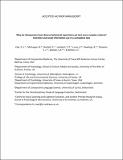Why do chimpanzees have diverse behavioral repertoires yet lack more complex cultures? Invention and social information use in a cumulative task
Abstract
Humans are distinctive in their dependence upon products of culture for survival, products that have evolved cumulatively over generations such that many cannot now be created by a single individual. Why the cultural capacity of humans appears unrivalled in the animal kingdom is a topic of ongoing debate. Here we explore whether innovation and/or social learning propensities may constrain the ability of one of our closest living relatives, chimpanzees (Pan troglodytes), to master an extractive foraging and tool-use task designed to afford opportunities for cumulative culture to develop. We further explore the potential demographic characteristics associated with novel task solutions. Chimpanzees (N = 53) were inventive, flexibly exploring the novel task, albeit complex inventions were rare and shaped by prior individual experience with similar tool-use tasks. However, they displayed no evidence of cumulative cultural learning. Communities displayed richer behavioral repertoires and had greater task success than chimpanzees tested in an asocial control condition, but their solution complexity did not surpass what individuals invented. The lack of social transmission of complex and beneficial solutions in contexts like those we studied provides one explanation for the limited cumulative culture observed in this species.
Citation
Vale , G L , McGuigan , N , Burdett , E , Lambeth , S P , Lucas , A , Rawlings , B , Schapiro , S J , Watson , S K & Whiten , A 2020 , ' Why do chimpanzees have diverse behavioral repertoires yet lack more complex cultures? Invention and social information use in a cumulative task ' , Evolution and Human Behavior , vol. In press . https://doi.org/10.1016/j.evolhumbehav.2020.11.003
Publication
Evolution and Human Behavior
Status
Peer reviewed
ISSN
1090-5138Type
Journal article
Description
G.L.V., A.L., E.B., N.M and A.W. were funded by the John Templeton Foundation (Grant ID: 40128 to A.W. and K. Laland). Support for the chimpanzee colony came from NIH U42-OD-011197.Collections
Items in the St Andrews Research Repository are protected by copyright, with all rights reserved, unless otherwise indicated.

